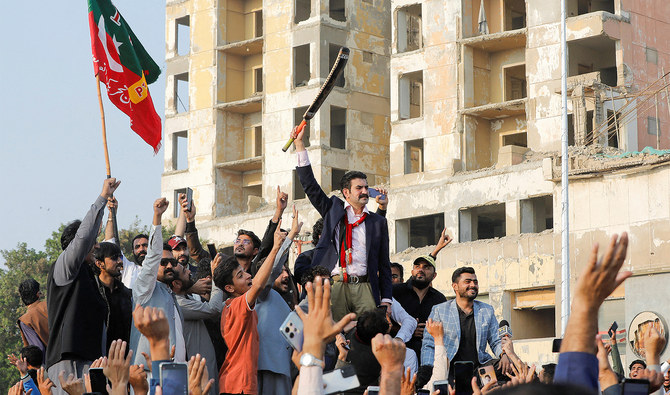ISLAMABAD: The party of former Pakistan prime minister Imran Khan has been stripped of its traditional electoral symbol of a cricket bat in a court ruling, the latest blow to the jailed leader ahead of a national election in February.
Here are some facts about the significance of electoral symbols and the challenges facing Khan’s party, the Pakistan Tehreek-e-Insaf (PTI).
WHAT IS AN ELECTORAL SYMBOL?
Electoral symbols — unique pictorial identifiers — are handed out by the election commission to political parties and candidates. Parties usually have long-standing symbols, which, for the PTI, was the cricket bat, referencing Khan being a celebrated former captain of the national cricket team.
The symbols appear on ballot papers, with voters able to put a stamp on their symbol of choice. The ballot paper also has names, but over 40 percent of Pakistan’s 241 million population are illiterate, making the pictures extra important for recognition.
A majority of Pakistan’s constituencies are in rural areas where the literacy rate is around 50 percent, according to the economic survey of 2022-23.
Pakistan’s election process involves thousands of candidates and dozens of political parties and symbols. A single ballot paper has a long list of options for voters.
A total of 150 symbols have been assigned to political parties and another 174 will be given to independent candidates for this election.
Three time prime minister Nawaz Sharif’s party uses a tiger, while the party of Bilawal Bhutto Zardari, the son of slain premier Benazir Bhutto, uses an arrow.
Symbols available to independents include a donkey cart and an ironing board.
WHY WAS THE SYMBOL REMOVED?
The Election Commission of Pakistan stripped the PTI of the symbol on technical grounds that it had not held intra-party elections, a prerequisite for any party to take part in the Feb. 8 vote.
The party challenged that ruling in the Supreme Court, which ruled against it on Jan. 13. The party alleges the powerful military is attempting to keep it out of the election race, a charge the army denies.
WHAT CHALLENGES DOES THIS POSE FOR IMRAN KHAN?
Alongside Khan’s legal troubles, his party now no longer has a single electoral symbol to rally behind. Instead, each of his hundreds of candidates have been given separate symbols from the independent symbol list — including dice and a bowl.
That means confusion for his voters and also extra costs to produce separate campaign material, such as banners, for each candidate.
Khan’s party has, for now, also lost its registered status with the election commission, which means that his candidates’ bloc will not be eligible for reserved seats handed out to political parties.
There are 70 seats reserved for women and religious minorities in the National Assembly, given to parties in proportion to the number of their candidates winning elections. This provides a boost to party positions in parliament.


















